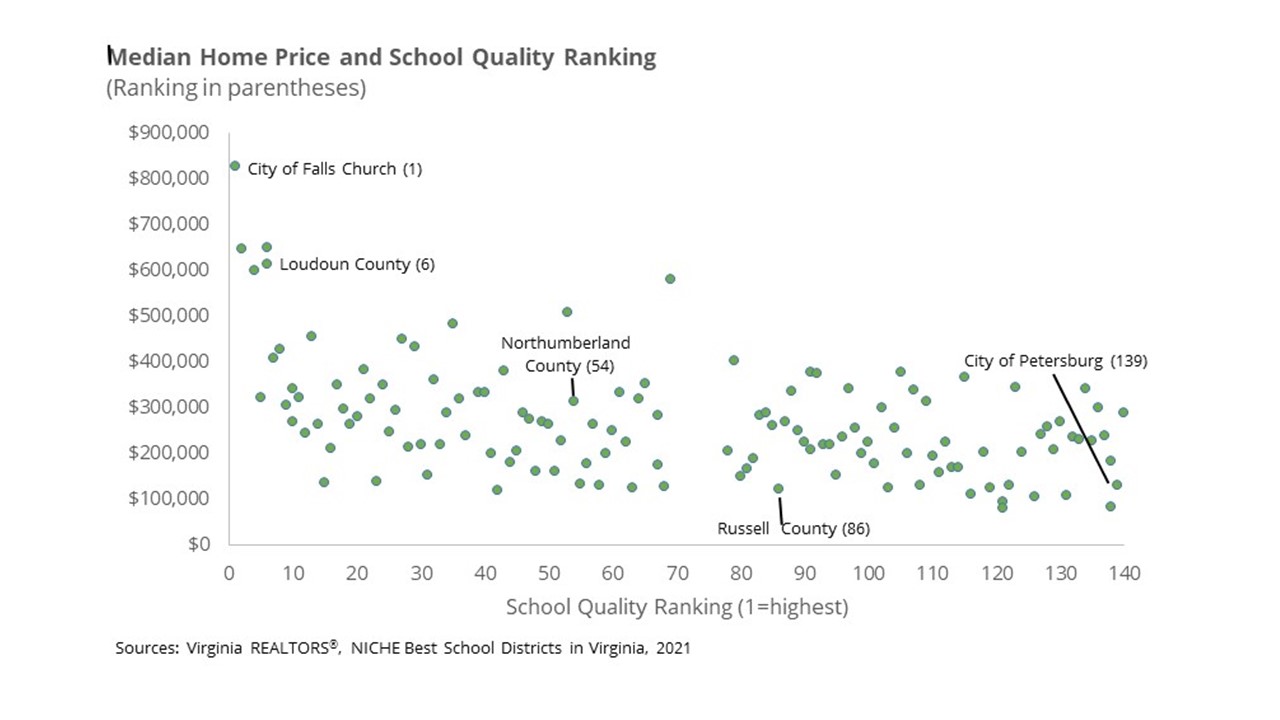School Quality and Home Prices: What’s the Connection?
August 26, 2021
According to a recent survey by the National Association of REALTORS®, 24% of home buyers said that the quality of schools was important when they were looking for a new home. That share rises to 42% for prospective home buyers between the ages of 31 and 40. The increased availability of school data—including standardized test scores, completion rates, and student-teacher ratios—has made it easier than ever before for families to research school district characteristics when looking for a home.
The Value of School Quality
REALTORS® know that many home buyers strongly value school quality. Many buyers say they compromise on other home features to be in their preferred school district. Several research studies have also documented the relationship between school quality and home prices:
- One study showed that a five percent improvement in test scores in a school district can raise home prices by 2.5 percent.
- According to an opendoor.com study, homes in top-ranked school districts receive significantly more views online from prospective home buyers and sell an average of eight days faster than homes in school districts ranked lower.
- Duke University researchers found that home values increase by $0.52 per square foot for every percentage point increase in a school district’s test scores.
- A study by the Brookings Institution showed that average home values are $205,000 higher in high-scoring school districts than they are in low-scoring school districts.
School Quality and Home Prices in Virginia
Across the commonwealth, public school quality—measured by student test scores and other standardized metrics—vary considerably. Looking at recent data on school quality and home prices demonstrates that there is a slight correlation between the two. Counties or independent cities in Virginia that have a higher public school quality rank tend the have higher home prices. (School quality rankings go from 1—the highest-ranked school district—to 140.)
There are several caveats about this relationship in Virginia. The correlation between school quality and home price is not as strong for communities outside of the top 10 school ranking. Furthermore, more highly-ranked schools according to these measures are more likely to be in Northern Virginia where other factors drive up home prices. Finally, school quality rankings are published for counties or independent cities overall and do not reflect school-to-school variations within a county or city.

Talking About School Quality
While the quality of neighborhood schools is important to many home buyers, REALTORS® need to be cautious when talking with clients about school quality. NAR’s Code of Ethics prevents REALTORS® from steering a buyer toward or away from a community based on race, color, religion, gender, disability, familial status, or national origin. Referring to a school system as “good” or “bad” could be code for racial or other demographic differences. REALTORS® can instead refer clients who are interested in schools to the Virginia Department of Education or another source so that they can research information about schools themselves.
For more information about Virginia’s housing market and the factors that influence home prices, check out the Virginia REALTORS® Research and Data website.
Click here to send any comments or questions about this piece to Virginia REALTORS® Chief Economist Lisa Sturtevant, PhD.
You might also like…
See It, Want It, Buy It: Single Female Homeownership
By Dominique Fair - March 11, 2025
Women have fought for a lot over the last 177 years, whether it was for fair wages, the right to vote, or to be able to own a… Read More
Impact of Infrastructure Projects on Residential Markets
By Sejal Naik - February 27, 2025
“Location, location, location” is often quoted in the real estate market and emphasizes the importance of location-based features in people’s housing market decisions. While many locational characteristics stay… Read More
Key Takeaways: January 2025 Virginia Home Sales Report
By Virginia REALTORS® - February 26, 2025
Key Takeaways Virginia’s housing market saw a slight uptick in activity at the beginning of 2025. There were 5,758 home sales across the commonwealth in January 2025, 104… Read More